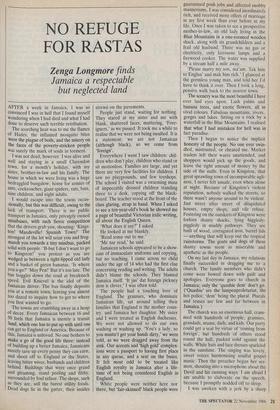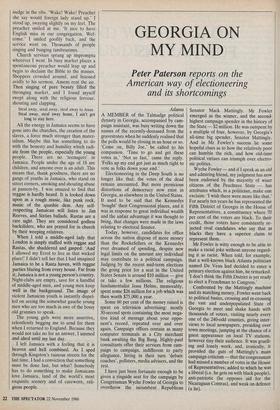NO REFUGE FOR RASTAS
Zenga Longmare finds
Jamaica a respectable but neglected land
AFTER a week in Jamaica, I was so convinced I was in hell that I found myself wondering when I had died and what I had done to deserve such terrible retribution.
The scorching heat was to me the flames of Hades, the inflamed mosquito bites were the plague of boils, and the misery on the faces of the poverty-stricken people was surely the mark of souls in torment.
I was not dead, however. I was alive and Well and staying in a small Clarendon town, for a month's holiday, with my sister, brother-in-law and his family. The house in which we were living was a huge bedraggled bungalow, home for armies of ants, cockroaches, giant spiders, rats, bats, nine children, and eight adults.
I would escape into the towns occas- :sionally, but this was difficult, owing to the lack of transport. There is no public transport in Jamaica, only privately owned minibuses, with such fierce competition that the drivers grab you, shouting: 'Kings- ton! Mandeville! Spanish Town!' The strongest of the lot will seize you and frog- march you towards a tiny minibus, packed solid with people. 'B-but I don't want to go to Kingston!' you protest as you are wedged in between a tight-lipped old lady and a basket of green bananas. 'Is where you a-go?'May Pen!' But it's too late. The bus boggles down the road at breakneck speed. Evil Knievel is the idol of the Jamaican driver. The bus finally deposits you at a remote town, leaving you almost too dazed to inquire how to get to where You first wanted to go.
The towns are crumbling away in a heap of decay. Every Jamaican between 16 and 50 feels that Jamaica is merely a transit land, which one has to put up with until one can get to England or America. Because of this, Jamaica is unloved. No one bothers to make a go of the good life there: instead of building up a better Jamaica, Jamaicans merely save up every penny they can earn, and shoot off to England or the States, leaving bitter wives, husbands and children behind. Buildings that were once grand and gleaming, stand peeling and filthy, surrounded by foul refuse. The shops, such as they are, sell the barest utility foods. Dead dogs lie in the gutter, their insides strewn on the pavements.
People just stand, waiting for nothing. They stared at my sister and me with blank, shuttered faces, muttering, 'Fore- igners,' as we passed. It took me a while to realise that we were not being insulted. It is a statement; we are not Jamaican (although black), so we come from `foreign'.
Everywhere I went I saw children: chil- dren who don't play, children who stand or sit motionless. Families are large, and yet there are very few facilities for children. I saw no playgrounds, and few toyshops. The school I visited was a swarming mass of impeccably dressed children standing three to a desk, copying off the black- board. The teacher stood at the front of the class glaring, strap in hand. When I asked to see a ten-year-old's book he showed me a page of beautiful Victorian italic writing, all about the English. Queen.
`What does it say?' I asked.
He looked at me blankly.
`Read some out to me.'
`Me nar read,' he said.
Jamaican schools appeared to be a show- case of immaculate uniforms and copying, but no teaching. I came across no child under the age of 14 who had the first clue concerning reading and writing. The adults didn't blame the schools. They blamed Jamaica itself. 'It jus' dat foreign pickney dem is clever,' I was often told.
The people had a touching love of England. The grannies, who dominate Jamaican life, sat around telling their families that England is the mother coun- try, and Jamaica her daughter. My sister and I were treated as English duchesses. We were not allowed to do our own washing or washing up. 'You's a lady, so you mustn't get your hands dirty,' we were told, as we were dragged away from the sink. Our accents and 'high gold' complex- ions were a passport to having first place in any queue, and a seat on the buses. It felt most odd to be treated like English royalty in Jamaica after a life- time of not being considered English in England.
White people were neither here nor there, but lair-skinned' black people were
guaranteed posh jobs and affected snobby mannerisms. I was considered inordinately rich, and received more offers of marriage in my first week than ever before in my life. Once I was taken to see a prospective mother-in-law, an old lady living in the Blue Mountains in a one-roomed wooden shack, along with six grandchildren and a frail old husband. There was no gas or electricity, only kerosene lamps and a firewood cooker. The water was supplied by a stream half a mile away.
`Please marry my son, ma'am. Tek him to Englan' and mak him rich.' I glanced at the gormless young man, and told her I'd have to think it over. Then I took a long, pensive walk back to the nearest town.
The scenery was the most beautiful I have ever laid eyes upon. Lush palms and banana trees, and exotic flowers, all in vivid colours. Fabulous mountains, rivers, gorges and lakes. Sitting on a rock by a waterfall in the Blue Mountains, I realised that what I had mistaken for hell was in fact paradise.
Then I began to notice the implicit honesty of the people. No one ever swin- dled, mistrusted, or cheated me. Market traders left their wares unattended, and shoppers would pick up the goods, and leave the right amount of money by the side of the stalls. Even in Kingston, that great sprawling town of incomparable ugli- ness, I never felt unsafe, even when alone at night. Because of Kingston's violent reputation, nobody walked the streets, so there wasn't anyone around to be violent. Just street after street of dilapidated houses, empty shops, and vile refuse. Festering on the outskirts of Kingston were forlorn shanty shacks, lying higgledy- piggledy in muddy pathways. They are built of wood, corrugated iron, barrel lids — anything that will keep out the tropical rainstorms. The goats and dogs of these shanty towns seem as miserable and apathetic as the people.
On my last day in Jamaica, my relations finally succeeded in dragging me to a church. The family members who didn't come were bowed down with guilt and apologies. Everyone goes to church in Jamaica; only the `quashie dem' don't go. (`Quashie' are the lumpenproletariat, the hoi polloi; `dem' being the plural. Plurals and tenses are few and far. between in Jamaica.)
The church was an enormous hall, cram- med with hundreds of people, grannies, grandads, mums, dads, and kids. Our party could get a scat by virtue of 'coming from foreign', but hundreds of others stood round the hall, packed solid against the walls. White hats and lace dresses sparkled in the sunshine. The singing was lovely, sweet voices harmonising soulful gospel music. Then the preacher began her ser- mon, shouting into a microphone about the Devil and his cunning ways. I am afraid I am unable to elaborate on the speech, because I promptly nodded off to sleep.
I was awoken with a jerk by a sharp nudge in the ribs. 'Wake! Wake! Preacher she say would foreign lady stand up.' I stood up, swaying slightly on my feet. The preacher smiled at me. 'It nice to have English miss in our congregation. Wel- come.' I smiled goofily back, and the service went on. Thousands of people singing and banging tambourines.
Church services sprang up impromptu wherever I went. In busy market places a spontaneous preacher would leap up and begin to declaim the Bible to the masses. Shoppers crowded around, and listened avidly to his sermon. Amens rent the air. Then singing of pure beauty filled the thronging market, and I found myself swept along with the religious fervour, shouting and clapping.
Steal away, steal away, steal away to Jesus Steal away, steal away home, I ain't got long to stay here.
All the energy in Jamaica seems to have gone into the churches, the creation of the slaves, a force much stronger than mater- ialism. Maybe this has something to do with the honesty and humility which radi- ate from the people, especially the young people. There are no 'teenagers' in Jamaica. People under the age of 18 are children, and anyone over is an adult. This means that, thank goodness, there are no gangs of youths in Jamaica, who stand on street corners, smoking and shouting abuse at passers-by. I was amazed to find that reggae is hardly heard. It is looked down upon as a rough music, like punk rock, music of the quashie dem. Any self- respecting Jamaican will listen to Jim Reeves, and Sixties ballads. Rastas are a rare sight. They are considered godless backsliders, who are prayed for in church by their weeping relatives.
When I told a middle-aged lady that London is simply stuffed with reggae and Rastas, she shuddered and gasped: 'And I allowed my Errol to live in that wicked place!' I didn't tell her that I had imagined Jamaica to be a Rasta haven, with reggae parties blaring from every house. Far from it; Jamaica is not a young person's country. Night-clubs are empty, save for a handful of middle-aged men, and young men keep well in the background. The image of violent Jamaican youth is instantly dispel- led on seeing the somewhat gauche young men who are too much in awe of the bossy old grannies to speak.
The young girls were more assertive, relentlessly begging me to send for them when I returned to England. Because they would not take no for an answer, I ummed and ahed until my last day.
I left Jamaica with a feeling that it is heaven and hell combined. As I sped through Kingston's ruinous streets for the last time, I had a conviction that something must be done fast, but what? Somebody has to do something to make Jamaicans love Jamaica, land of the world's most exquisite scenery and of careworn, reli- gious people.



























































 Previous page
Previous page